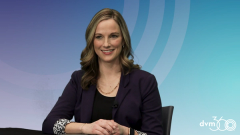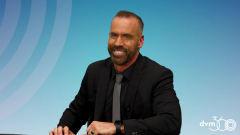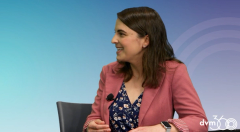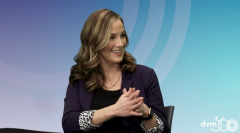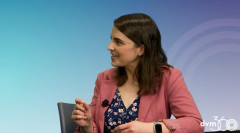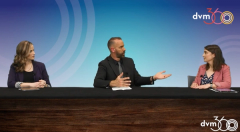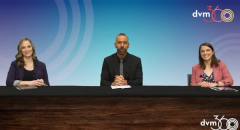
Behind the science
Jenna Dockweiler, MS DVM, DACT, CCRT, CVAT, and Lindsey Kock, DVM, explain why the science behind genetics should be taught to vet staff and current students.
Episodes in this series

Sponsored by Embark
Adam Christman, DVM, MBA: Once we have the Embark DNA testing going on, what does that look like from a CSR perspective, a technician, and a generalist?
Jenna Dockweiler, MS DVM, DACT, CCRT, CVAT: Absolutely, so we have a couple of different options with our Embark clinic testing. So the first option is you can carry the tests in clinic. You can buy them in bulk packs, do the swab right there in the exam room, and send it off. The results will go back to the veterinarian first so they have a chance to review those results and then those can be released to the client. That's option one.
Option two, for folks who maybe don't have a lot of inventory space, would be our recommend and review program. Essentially, the client orders through our website through a special QR code. They get a little bit of a discount on their test purchase and then once that results comes back, they go to the veterinarian and the client at the same time. The veterinarian's experience as far as the very detailed reporting and the support with me is not different, but the client will get the result at the same time. So just two different options for the testing.
As far as how we've seen this work best in clinics is it is very, very, very helpful to assign a genetics champion to be the one to have that initial conversation about the benefits of genetic testing with your clients. And typically that is a technician or another interested staff member. Embark will absolutely support training that person. We offer lunch and learns to get all the clinic staff kind of up to speed on what the testing looks like, how to have those initial conversations.
Adam Christman, DVM, MBA: I wanna talk about our educational school and that school with genetics. I'm curious to get your thoughts on where we should be going in the next five to 10 years with genetic counseling and understanding for the new graduates that are coming out of school.
Jenna Dockweiler, MS DVM, DACT, CCRT, CVAT: Typically we don't get much genetics education in either vet or tech schools. So typically whenever I speak, I always tell people, “hey, you're gonna be reaching back to your high school biology. We're gonna be talking about Mendel's peas today.” So I think that there is definitely an opportunity. I would say just doing like a brief review of the modes of inheritance, which is the way that a variant is passed on to the next generation, would be really, really helpful if we had that kind of again in vet school. Then, using some examples with either breeding dogs and how to smartly pair them, or with personalized medicine and individual dogs who may be at risk for genetic diseases.
Adam Christman, DVM, MBA: I think the new graduates know about this. They're excited about it, but I think they're just learning so much through mentorship and trying to get their communication under control. But I do think that this is a great opportunity for a mentorship opportunity for hospitals to teach the new grads. This is what we should do moving forward, right?
Lindsey Kock, DVM: Yeah, absolutely. I think one thing to maybe be cautious of not getting too bogged down in is, there's over 350 some odd different variants that we know of in the world of dogs. So I think if you come at it from the perspective of like, "Oh my gosh, I got to know all of the details about all of these disorders,” there's a new one coming out every week, right, that may only affect a certain subpopulation or a certain breed of dog.
And so I think the recommendation to really focus on inheritance, is huge because it helps you interpret the results for the pet parent. And then making sure that when you do testing, you do it from a reputable lab that lets you know what the inheritance is as well, right? And it tells you what actual marker they're looking at, because that is also important in the interpretation of those results.
Adam Christman, DVM, MBA: The fact that you can talk to somebody at Embark to go over these results, I was just going to mention that. Because I know that you feel inundated if you get these results, but it's almost as if going through a ClinPath case when you're calling your reference lab, you want to walk through some of the differentials. So it's important. I'm sure you must get quite a few phone calls with that.
Jenna Dockweiler, MS DVM, DACT, CCRT, CVAT: Absolutely. I talk to veterinarians all day long helping them interpret their results and then again as a theriogenologist, I'm definitely able to help with the breeder clients as well.
Newsletter
From exam room tips to practice management insights, get trusted veterinary news delivered straight to your inbox—subscribe to dvm360.

